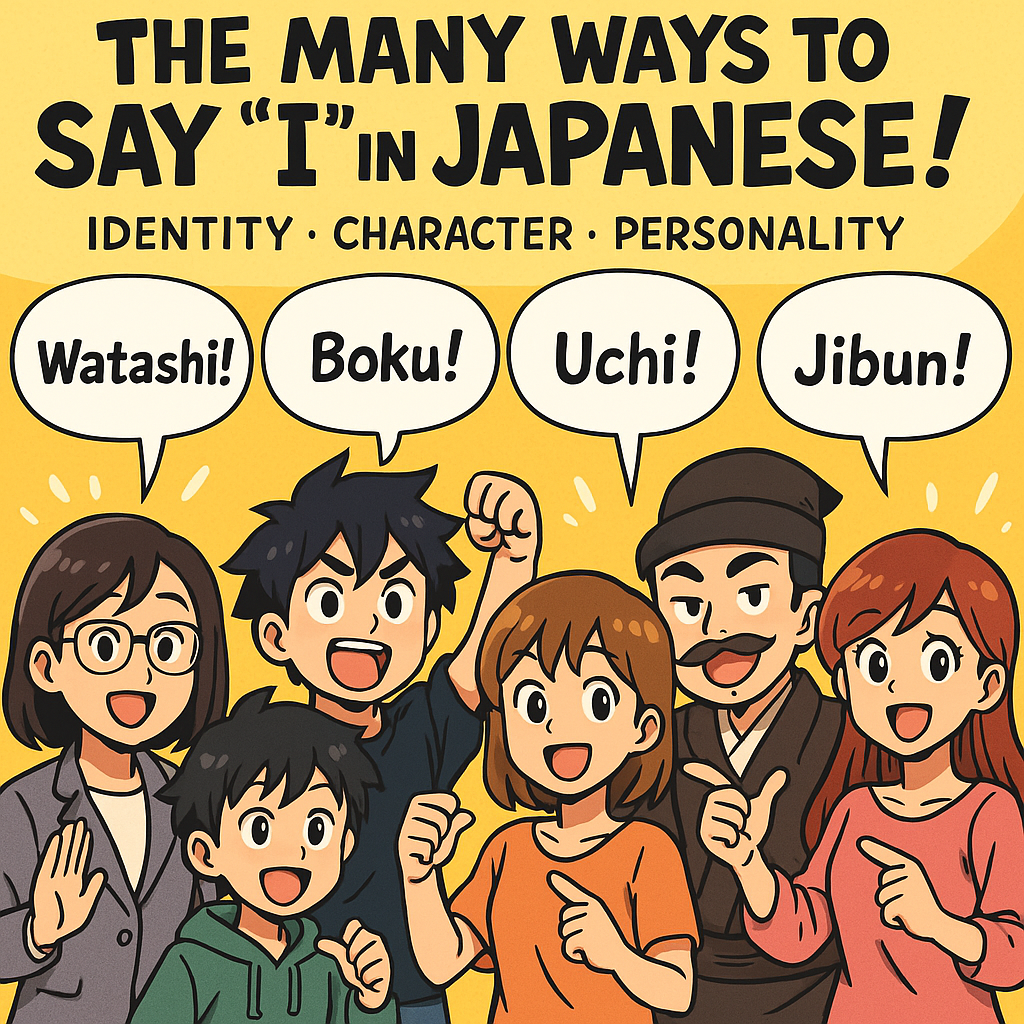
はじめに / Introduction
日本語には「I(私)」にあたる言葉が数多くあります。
そのバリエーションは、性別・年齢・社会的立場・地域・話し手の性格や、話す相手やシチュエーションによって細かく使い分けられます。
一人称の選び方一つで、自分の印象やコミュニケーションの雰囲気がガラリと変わるのが日本語の面白いところです。
Japanese has a surprising number of ways to say “I.”
The pronoun you choose depends on your gender, age, social role, region, personality, and also on whom you’re talking to and in what situation.
Your choice of first-person pronoun can dramatically change the impression you give and the overall mood of your conversation.
英語では “I” 一語しかありませんが、日本語では一人称そのものが「アイデンティティ」「関係性」を表現する重要なツールとなります。
学習者が日本語で自然に話すためには、自分に合った一人称を使い分けられるようになることが大切です。
In English, “I” is basically the only option, but in Japanese, your choice of pronoun is an important tool for expressing your identity and your relationship with others.
If you want to sound natural in Japanese, learning how to use different first-person pronouns is essential.
歴史や文化の背景 / Historical and Cultural Background
日本語の一人称は、時代や文化の中で変化してきました。
江戸時代には「拙者(せっしゃ)」「某(それがし)」「余(よ)」など、時代劇でおなじみの表現が一般的でした。
現代では「私」「僕」「俺」などが多く使われますが、文学やアニメ、方言の中には今も昔の一人称が登場します。
The way people refer to themselves in Japanese has changed over time.
In the Edo period, words like "sessha," "soregashi," or "yo" were common, especially among samurai (you might hear these in period dramas).
Today, “watashi,” “boku,” and “ore” are the most widely used, but you can still find the older forms in literature, anime, or regional dialects.
一人称の多様さは、日本社会の「上下関係」や「内と外の意識」と深く結びついています。
丁寧さや親しみやすさ、性別、所属意識などを、無意識のうちに一人称で表現しています。
The variety of first-person pronouns in Japanese reflects the culture’s strong sense of social hierarchy and the distinction between insiders and outsiders.
Politeness, friendliness, gender, and a sense of belonging can all be subtly expressed simply by the way you refer to yourself.
主な一人称とその使い分け / Major First-person Pronouns & How to Use Them
私(わたし/わたくし) 男女問わず使える最も無難で丁寧な一人称。 「わたくし」はさらに格式高く、公式の場やスピーチでよく使われます。
Watashi / Watakushi(私) The most standard, gender-neutral, and polite first-person pronoun. “Watakushi” is even more formal, used in official speeches or very polite situations.
僕(ぼく) 主に男性(特に少年や若者)が使うやわらかく親しみやすい一人称。 女性がカジュアルな場で使うことも増えていますが、フォーマルな場には向きません。
Boku(僕) Used mainly by males, especially boys and young men. It’s gentle and friendly. Sometimes women use it casually too, but it’s not suitable for formal situations.
俺(おれ) 男性が親しい友人同士やくだけた会話で使う強めで男らしい一人称。 目上の人やビジネスシーンでは失礼になるので注意!
Ore(俺) Masculine and strong, used by men with close friends or in informal contexts. Using “ore” with superiors or in business is considered rude.
あたし/あたくし 主に女性が使うくだけた一人称(「あたくし」は非常に上品)。 会話の雰囲気やキャラによって使い分けられます。
Atashi / Atakushi Used mainly by women; “atashi” is casual, “atakushi” is very refined and old-fashioned. The nuance changes depending on the speaker’s character or the situation.
うち 関西地方の方言が発祥で、特に女性に多い一人称。 若い世代を中心に、全国的にも使われるようになっています。
Uchi Originates from the Kansai region, mainly used by women. It’s become popular among young people all over Japan.
その他 「自分」「わし」「おいら」「我輩」「拙者」など、方言・年代・キャラクターによって多様な一人称があります。 アニメや漫画、小説では独自の一人称がキャラクター性を強調するために使われることもあります。
Others “Jibun,” “washi,” “oira,” “wagahai,” “sessha,” etc.—dialects, age, or unique personalities can add even more variety. In manga, anime, and literature, original first-person pronouns are often used to emphasize a character’s traits.
選び方で印象や関係性が大きく変わる / The Impact of Your Choice
一人称の選び方ひとつで、相手への印象や親しさ・距離感が大きく変わります。
例えば、同じ内容でも「私」と「俺」ではまったく違う雰囲気に聞こえることがあります。
初対面や目上の人には「私」、親しい友人には「僕」や「俺」、カジュアルなグループでは「うち」や「自分」などが使われます。
Just by changing your pronoun, you can alter how close or distant you sound.
For example, the same sentence said with “watashi” and with “ore” can give completely different impressions.
“Watashi” is good for formal or new relationships, “boku” or “ore” for friends, and “uchi” or “jibun” for casual groups.
アニメや漫画のキャラクターは、独特な一人称で個性を表現することがよくあります。 例:「我輩は猫である」「ボクっ娘」「オレ様キャラ」など。 方言で「おい」や「わし」を使う地方もあります。
Anime and manga characters often use unique first-person pronouns to show their personality.
For example: “wagahai” (classic literature cat), “boku” (boyish girls), “ore-sama” (self-important tough guy).
Some dialects use “oi” or “washi” as well.
一人称を間違えると、親しさが伝わらなかったり、逆に失礼な印象になったりすることもあるので要注意です。
Be careful—using the wrong pronoun can make you seem unfriendly, or even rude!
学習者が間違えやすいポイント / Common Pitfalls for Learners
多くの日本語学習者は、「僕」と「俺」を混同したり、男女で適切な一人称がわからなくなることがあります。
また、敬語と一人称の組み合わせも注意が必要です(「俺ですが、お世話になります」はややアンバランス)。
SNSや現代の若者言葉では新しい一人称も時々現れるので、場面に合わせて選ぶことが大切です。
Many learners confuse “boku” and “ore,” or aren’t sure which pronoun is best for their gender.
It’s also important to match your pronoun with the right level of politeness (for example, “ore desu ga, osewa ni narimasu” sounds a little odd).
New first-person words sometimes pop up on social media or among young people, so always choose based on the situation.
会話例 / Sample Dialogue
A: みんな、自己紹介しよう!
B: こんにちは。私は山本です。
C: よろしく!ぼくは斎藤だよ。
D: オレは田村。よろしくな!
E: うちは関西出身やで。
F: ボクっ娘キャラのミカです!
A: Let’s all introduce ourselves!
B: Hello, I’m Yamamoto. (“watashi”)
C: Nice to meet you! I’m Saito. (“boku”)
D: I’m Tamura. (“ore”) Nice to meet you!
E: I’m from Kansai. (“uchi”)
F: I’m Mika, a "boku-girl" character!
面白い豆知識 / Fun Facts
「我輩(わがはい)」は夏目漱石の小説『吾輩は猫である』の主人公が使う一人称として有名になりました。
「おいら」「あっし」などは時代劇や落語でおなじみ。
最近ではYouTuberやネットスラング発の新しい一人称も登場しています。
“Wagahai” became famous thanks to the classic novel "I Am a Cat" by Natsume Soseki.
"Oira" and "asshi" are often heard in period dramas and rakugo storytelling.
Recently, some YouTubers or online communities have invented their own first-person pronouns!
まとめ / Conclusion
日本語の一人称は、文化・歴史・社会・キャラクターが詰まったとても面白いポイントです。
使い分けを知ることで、日本語のニュアンスや人間関係の奥深さも感じられるようになります。
自分のキャラクターや場面に合った一人称を探して、日本語の会話をもっと楽しみましょう!
Japanese first-person pronouns are a fascinating mix of culture, history, society, and personality.
Learning how to use them helps you understand Japanese nuance and relationships much more deeply.
Try out different first-person words and see which one fits your character and your situation!